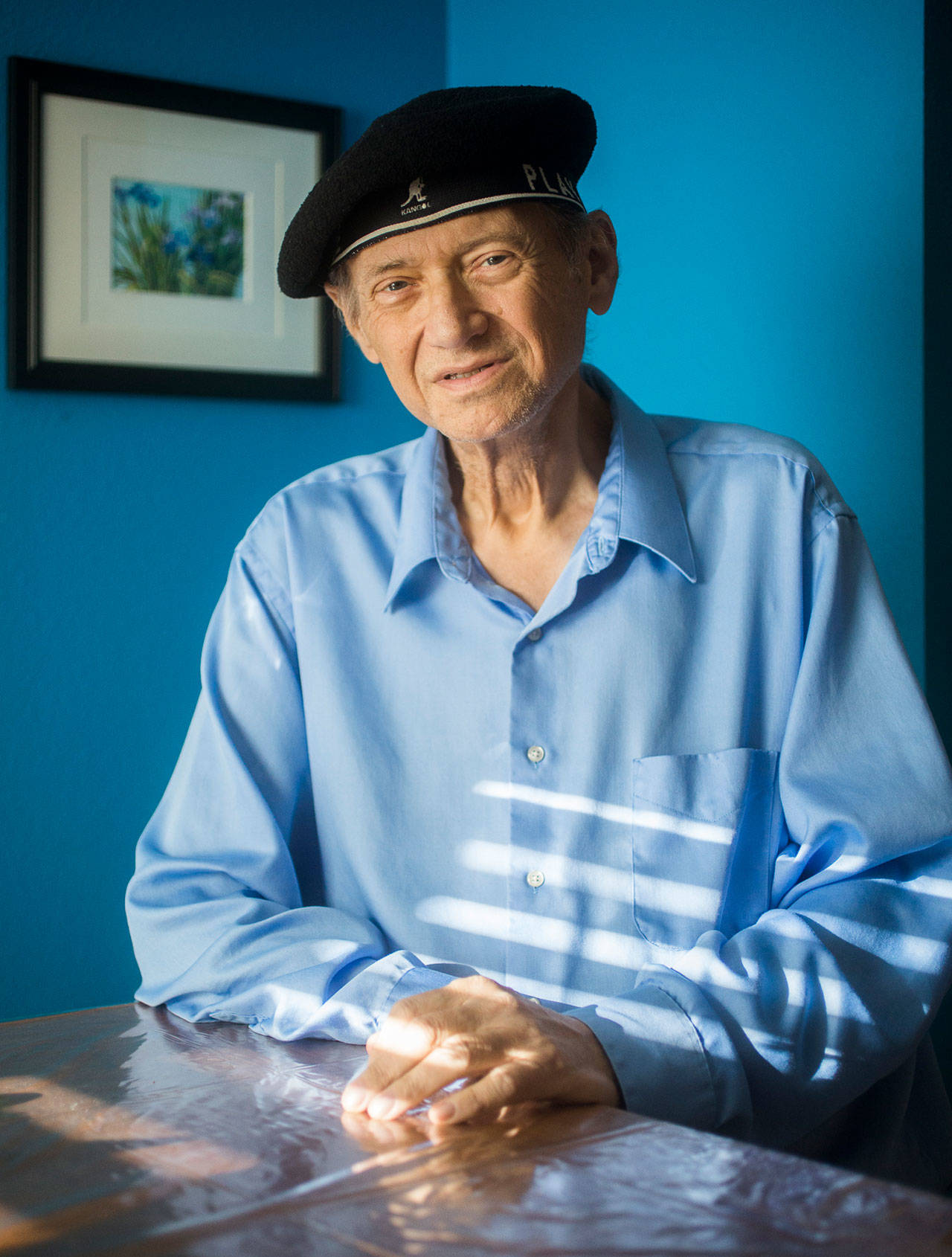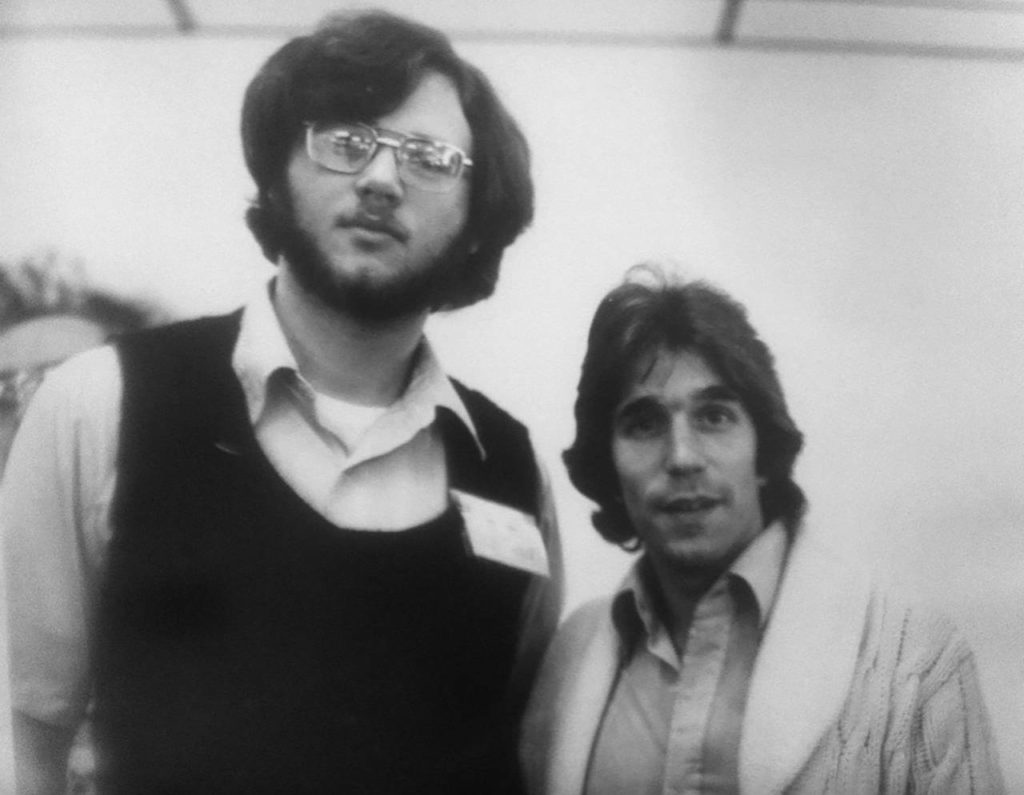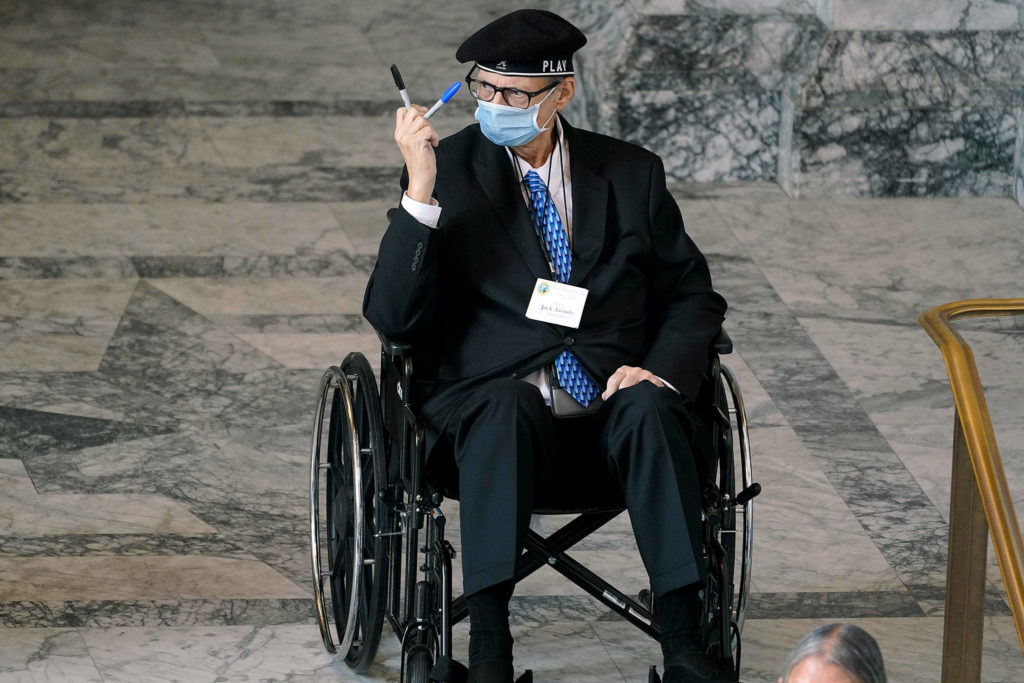EVERETT — His determination was strong, his body was frail.
Jack Arends made headline news in December when he went to the state Capitol in Olympia to cast his Electoral College ballots for then president-elect Joe Biden and vice-president-elect Kamala Harris.
Arends, terminally ill with a failing heart and kidneys, was the lone elector from Snohomish County. He entered the chamber of the state Senate in a wheelchair, wearing a loose black suit and “Play Nice” beret.
Instead of a ceremonial quill pen, he used a Sharpie to cast his vote. After emotional remarks that drew applause from peers, he lowered his head on the wooden desk and cried.
The road trip was a break from his Everett life of dialysis and doctor visits.
Arends died July 18. He was 64.
“Jack was brave and considerate of others until the end,” said Mike Dillon, his friend and former publisher. “He was a serious student of politics and history, proud of his Nordic heritage, and disliked entitled bullies. When he believed in something, he stood his ground. I think that’s what people sensed in him — an uncommon human decency. And he was fun to be around.”
Arends, a self-described grassroots activist, was a state convention delegate and precinct committee officer.
He represented the 2nd Congressional District as an elector following the contentious 2020 presidential election in which the Democratic ticket won the state with nearly 58% of the popular vote. In 2016, four Washington electors went rogue, breaking a pledge to cast their votes for Democratic candidate Hillary Clinton, who captured the most votes.
“It’s a great weight lifted from my shoulders being able to do this,” Arends said after the December vote. “I feel gratified to do what we were elected to do.”
The mission of the dying man in the black beret went global.
“People Magazine. London Daily Mail. New York Times. It was insane,” said Clarence Moriwaki, a friend from Bainbridge Island who went to Olympia with him.
“He received flowers and gifts and cards with stamps from around the country and all over the place. He really touched a lot of people. It was humbling but he also enjoyed it.”
The limelight continued wherever Arends went, which was mostly to medical visits followed by Starbucks for a scone, always wearing his “Play Nice” beret.
“I would take him to his doctors’ appointments,” said Moriwaki, who stayed with him the last 10 days before his death. “Strangers would say, ‘Thank you for what you did. It’s an honor to meet you.’ Those little acts of recognition and kindness really boosted his spirits.”
U.S. Sen. Patty Murray, D-Wash., this week tweeted: “Like so many, I was sad to hear about the recent passing of Jack Arends. Jack was a passionate voice for Democrats—and his dedication to making his community and our state better will be so missed. I am proud to call him a friend.”
Arends, a West Bremerton High School graduate, earned a degree in communications in 1979 from Washington State University, where he was editor of The Daily Evergreen student newspaper. His first big newspaper job was in 1982 as a copy editor and zone section editor with the Memphis Press-Scimitar, an afternoon daily paper that folded in 1983.
He was at the Bellevue Journal-American, now the Bellevue Reporter, for five years in a variety of reporting and editing roles. Dillon said it was there that Arends honed his skills as a witty, politically savvy columnist with his “The Week in Review” section in the Sunday edition.
After two years at the Port Orchard Independent, he became editor of the Queen Anne & Magnolia News, where Dillon was publisher.
“Arends was an impactful editor in two of Seattle’s most vital neighborhoods, with his hard news reporting and brilliant, often bitingly funny column writing,” Dillon said. “These were the years when Seattle was beginning the process of rezoning itself — the Seattle Comprehensive Plan — which created the road map for remaking Seattle’s neighborhoods. All of this was grist for Jack’s ‘pen.’ He was a damn good writer.”
Arends worked for Boeing as a writer and editor. He retired from the company in 2016 as a staff analyst.
He managed the 2009 reelection campaign of his mother, Carol, for Bremerton City Council. She died in 2016 and his father, John, in 1983. In 1972 his younger brother, Jens, died after a car hit his bicycle.
“Jack didn’t talk much about this, but it certainly marked him, and gave him deeper insight into the human condition as a journalist,” Dillon said.
On the December trip to Olympia, Dillon and Moriwaki took Arends to the Tumwater cemetery where his only immediate family members are buried. A service will be held for Arends at a later date.
“I think Biden helped prolong his life. It gave him such joy to be one of those 306 people who officially got him elected,” Moriwaki said. “I give the new administration credit for giving Jack another six months of his life.”
“His December 14 speech in Olympia after casting his ballot for Joe Biden was Jack at his most heroic,” Dillon said. “On the drive back to Everett, we saw two rainbows.”
Video:
Andrea Brown: abrown@heraldnet.com; 425-339-3443. Twitter @reporterbrown.
Talk to us
> Give us your news tips.
> Send us a letter to the editor.
> More Herald contact information.




























